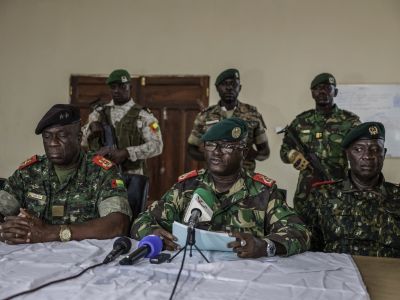The United States found itself isolated on two key Middle East issues as its partners in the international diplomatic "quartet" differed sharply with its stance on Yasser Arafat and the pace of Israel's response to Palestinian reforms.
During two hours of high-level talks, representatives of the United Nations, the European Union and Russia said they also told Secretary of State Colin Powell that headway must be made not just in curbing violence but in settling the Arab-Israeli conflict.
UN chief Kofi Annan, Russian Foreign Minister Igor Ivanov and Danish Foreign Minister Per Stig Moeller, representing the European Union, told reporters they all stood behind the Palestinian leader despite Bush's call for his ouster. "We all share the end objective of two states living in peace, side by side," Annan said. "What we have to do is to work out how we get there, what is the operational pathway that gets us to that goal in three years' time."
"As for Arafat, we all have our respective positions; the UN still recognizes Chairman Arafat, and we will continue to deal with him until the Palestinians decide otherwise," Annan said.
Ivanov and Moeller echoed those remarks. "It's only for the Palestinian people to decide who they want to have as their leader," Ivanov said. "It is the sovereign right of the Palestinian people. "As for Chairman Arafat, he is the legitimately elected leader of Palestine, and while he is in this capacity, we will continue to maintain our relations with him," he said.
Moeller shared those sympathies but did not mention Arafat by name. "We talk to the leader of the Palestinian people," said Moeller, whose country took over the rotating EU presidency earlier this month. "It is up to the Palestinian people to decide who is their leader," he said, looking forward to Palestinian elections that are set for early next year. "We will have an election, and then we will see who will become leader after the elections. Whoever is leader is the person the European Union is talking to," Moeller said.
Their diverse views overshadowed a uniform concern for the plight of the Palestinian people. Powell, Annan, Ivanov and European Union diplomat Javier Solana agreed that ways must be found to get more help to the Palestinians.
The four expressed their "increasing concern about the mounting humanitarian crisis in Palestinian areas and their determination to address urgent Palestinian needs." They agreed on the need for a coordinated international campaign to support Palestinian efforts at political and economic reform, and urged Israel to relax its curbs on Palestinian travel and withdraw its forces from Palestinian-held areas as security improves.
Arab position
Key Arab ministers have voiced strong support for a comprehensive plan to achieve Palestinian statehood within three years.
Foreign ministers Ahmed Maher of Egypt and Marwan Muasher of Jordan gave strong backing Tuesday to a three-track plan supported by the Middle East quartet.
"Maybe we do not agree on all the details, but we are determined to work together for peace, and I think we will succeed to bring peace to this area under the banner of legitimacy, democracy and prosperity for all," Maher said.
Muasher said the two Arab ministers, Saudi Arabia's U.N. Ambassador Fawzi Shobokshi, and top U.S., U.N., EU and Russian officials had made "good progress" at a meeting late Tuesday on a plan of action to move toward the end of Israel's occupation of the West Bank and achieving the vision of two states, Palestine and Israel, living side by side in peace, AP reported.
Jordan's Muasher said, "I think we are very encouraged by the fact that not only did we see a commitment today to the end game, and to a time frame of three years, but we also saw a commitment to developing a work plan that would take us through a series of stages - going through Palestinian reform and security definitely, but also starting a political process to give hope for Palestinians that they will witness the end of the occupation."
The international community must now agree on benchmarks to monitor progress to ensure that the political visions are translated into "a workable plan of action," he said. "And after the meetings today I'm encouraged that we are well on our way to do that."
"In our opinion, the Israelis have not lived up to their obligations," Egypt's Maher said. "We hope they will do that. The Palestinians have obligations, and I'm sure they will abide by these obligations. We are willing to help both sides to abide by their obligations in order to achieve peace."
"This is the meaning of this very important meeting which allowed us to discuss very frankly and openly and honestly different points of view," he said. "We came to a consensus that it is incumbent on us to help both parties reach a settlement." (Albawaba.com)
© 2002 Al Bawaba (www.albawaba.com)









